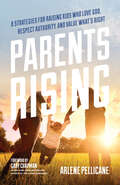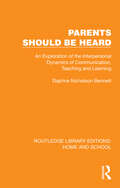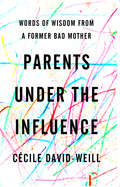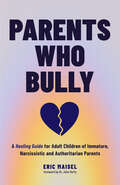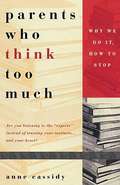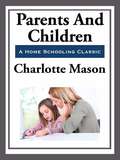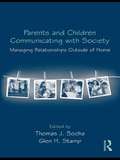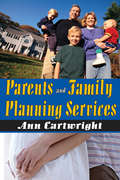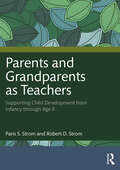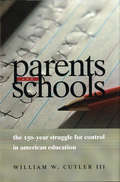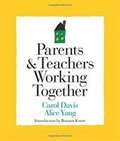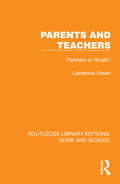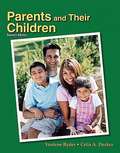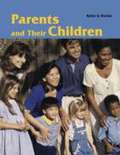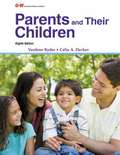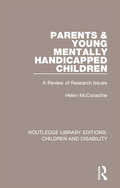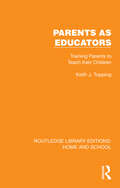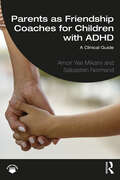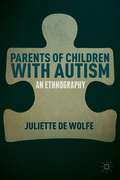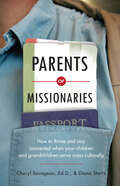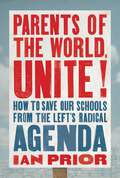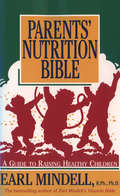- Table View
- List View
Parents Rising: 8 Strategies for Raising Kids Who Love God, Respect Authority, and Value What's Right
by Arlene PellicaneHow to raise godly children in a godless world Do you feel like you&’re fighting a losing battle? Against the culture, against the busyness, sometimes even against your spouse and kids… Often it seems like everything is against you as a parent, and your everyday life can feel far from joy-filled. But it doesn&’t need to be that way. Parents Rising will show you eight cultural trends that parents are up against today and what you can do to claim victory. This book is about growth not guilt. It&’s not a pep talk, or a &“try harder&” speech. This is real help for real problems that every parent faces. It&’s a way to focus your efforts so that they&’ll be more effective and you&’ll be less exhausted.
Parents Rising: 8 Strategies for Raising Kids Who Love God, Respect Authority, and Value What's Right
by Arlene PellicaneHow to raise godly children in a godless world Do you feel like you&’re fighting a losing battle? Against the culture, against the busyness, sometimes even against your spouse and kids… Often it seems like everything is against you as a parent, and your everyday life can feel far from joy-filled. But it doesn&’t need to be that way. Parents Rising will show you eight cultural trends that parents are up against today and what you can do to claim victory. This book is about growth not guilt. It&’s not a pep talk, or a &“try harder&” speech. This is real help for real problems that every parent faces. It&’s a way to focus your efforts so that they&’ll be more effective and you&’ll be less exhausted.
Parents Should Be Heard (Routledge Library Editions: Home and School)
by Daphne Nicholson BennettFor any parent or parent-to-be this book, originally published in 1972, was intended to open new doors, answering questions about themselves and their children, and be illuminating to many others professionally concerned with parents.Many real-life examples from the author’s work demonstrate how parents who are encouraged to express their feelings through discussion in an unjudging atmosphere can better ‘solve’ their problems and enjoy their children.Readers learn through the experience of these typical parents who overcame fears of expressing their often surprisingly complex feelings. They also share, indirectly, the results of greater understanding and better handling of practical problems, such as the child who cannot sleep or runs away from home, the child with learning difficulties, living with mother-in-law, teenage rebellion, drug abuse, family upheaval and social tension. Physical symptoms of personal strain, such as back and head aches, may disappear. Examples of play techniques to help children directly with their emotional problems are also given.The author believes that parenthood is a natural opportunity for personal growth and enjoyment of life. Her philosophy is one of prevention even more than cure – parents’ questions turn out to be the questions of all people, which left unheard and unanswered may lead to a multitude of social and personal ills.Conversely, greater understanding as parents can bring easier relationships at work, with friends and between husband and wife. The approach described often bridges a gap parents describe between knowing what to do, and how to do it.This book is a re-issue originally published in 1972. The language used is a reflection of its era and no offence is meant by the Publishers to any reader by this re-publication.
Parents Under the Influence: Words of Wisdom from a Former Bad Mother
by Cécile David-WeillPart American and part French, part memoir and part guide, this book offers a fresh, unique, and powerful perspective on the challenges of parenting and how to find a rewarding path forward for parents and children alike.How should we raise our children? It should be a simple enough question to answer but in fact it is an intimidating and complex one. We often address it by deciding to do either exactly what our parents did or just the opposite. After that we rely on a cocktail of love and instinct, hoping it will be enough to overcome the difficulties ahead. Far from having perfect free will, however, we are all under the influence. The child still within us confuses, influences, or undermines all our aspirations as parents and prevents us from sticking to the philosophy we initially hoped to follow. These unresolved emotions drive us to reproduce the upbringing we received, including the behaviors that have hurt us the most. In Parents Under the Influence, Cécile David-Weill draws on her own parenting blunders and successes as well as concrete examples, case studies, and works of fiction to guide readers, helping them heal from the past and become effective, nurturing parents.
Parents Who Bully: A Healing Guide for Adult Children of Immature, Narcissistic and Authoritarian Parents
by Eric MaiselBreak Free from Emotionally Abusive ParentsParents Who Bully exposes the hidden epidemic of parental emotional abuse and authoritarianism, providing crucial insights and healing strategies for those affected. Learn how to break free from toxic parenting and find the path to emotional recovery and freedom.Uncover the truth about authoritarian parenting in Parents Who Bully. Through compelling real-life accounts and authoritative research, you'll gain invaluable insights into the signs of emotionally abusive parents. Understand the lasting impact of authoritarian parenting styles, and discover the path to healing and emotional freedom. This eye-opening book empowers you to confront the turmoil and scars caused by parental emotional abuse, offering a guide to recovery and personal transformation.Are you ready to break free from the chains of the authoritarian personality?Parents Who Bully equips you with the tools to recognize and overcome the toxic dynamics of your family. With expert guidance, you'll learn how to deal with emotionally abusive parents, heal your emotional wounds, and ultimately find relief and empowerment.Inside, you’ll find:In-depth insights into emotionally abusive parents and their impact on adult childrenAuthoritative research and real-life accounts that demonstrate the signs of toxic parenting stylesPractical strategies to break free from bad parents and heal deep emotional woundsA comprehensive roadmap for understanding, recovery, and personal growth in the face of parental emotional abuseIf you learned from reading Recovering from Emotionally Immature Parents; Adult Survivors of Toxic Family Members; or Difficult Mothers, Adult Daughters; you’ll love Parents Who Bully.
Parents Who Cheat: How Children and Adults Are Affected When Their Parents Are Unfaithful
by Dr. Ana NogalesNationally known psychologist Ana Ledwin Nogales addresses the affects of parental infidelity on childhood development—and on these children's relationships as adults Many books explore the affects of marital infidelity on a marriage, but Parents Who Cheat is the first book to examine not only how this behavior contributes to the breakdown of a family structure but how it directly affects the children in that family. With compassion and piercing insight, Dr. Ana Ledwin Nogales explains how adultery damages a child's understanding of love, marriage, and trust. As these children grow toward adulthood, their ability to have healthy relationships is compromised. Through stories of children struggling to understand their parents' adultery, as well as case histories of adult children coping with unresolved issues related to parental infidelity, Dr. Nogales shows how destructive habits are formed and points the way toward healing and the creation of healthier relationships with parents and partners.
Parents Who Think Too Much: Why We Do It, How to Stop It
by Ann CassidyWith the baby boom generation came the genre of parenting books that told parents how to teach their kids everything from toilet training to developing self-esteem. Generally the message has been: go easy on your child, but hard on yourself. It is starting to become apparent, especially in the best of families, that giving your kids lots of choices, validating their feelings at great peril to your own and providing "enough" individual attention for each child is creating a generation of kids over whom we have no control.Cassidy argues that this comes from over-thinking our role as parents. We've pondered every step so much that the juice, the joy, and worst of all, our confidence is gone. The reasons are clear: We have fewer children later in life so we've had more time to ponder. We've grown up just as research on infant and child development has come of age, so there's no shortage of material to think about. As a generation we've prided ourselves on self-improvement and we bring the same zeal to child improvement. We're less likely to live close to our families, and so are more likely to seek out expert solutions.To counter this thinking, Cassidy will suggest keeping the big picture in mind--what kind of people do you really want your kids to be? Honest, kind, cooperative, empathetic? It may mean losing sight of whether enough play dates are scheduled for the week and if you've positively reinforced the latest creative endeavor, but it will bring back your instincts about what is important to your family as a whole, and to your kids to become decent people.From the Trade Paperback edition.
Parents and Children
by Charlotte MasonParents and Children consists of a collection of 26 articles from the original Parent's Review magazines to encourage and instruct parents. Topics include The Family; Parents as Rulers; Parents as Inspirers; Parents as Schoolmasters; The Culture of Character; Parents as Instructors in Religion; Faith and Duty (a secular writer has useful suggestions for using myths and stories to teach morals; along with the Bible, these can give examples of noble characters to emulate); Parents' Concern to Give the Heroic Impulse; Is It Possible?; Discipline; Sensations and Feelings Educable by Parents; What is Truth? (Dealing with Lying); Show Cause Why; A Scheme Of Educational Theory; A Catechism of Educational Theory; Whence and Whither; The Great Recognition Required of Parents; and The Eternal Child. Charlotte Mason was a late nineteenth-century British educator whose ideas were far ahead of her time. She believed that children are born persons worthy of respect, rather than blank slates, and that it was better to feed their growing minds with living literature and vital ideas and knowledge, rather than dry facts and knowledge filtered and pre-digested by the teacher. Her method of education, still used by some private schools and many homeschooling families, is gentle and flexible, especially with younger children, and includes first-hand exposure to great and noble ideas through books in each school subject, conveying wonder and arousing curiosity, and through reflection upon great art, music, and poetry; nature observation as the primary means of early science teaching; use of manipulatives and real-life application to understand mathematical concepts and learning to reason, rather than rote memorization and working endless sums; and an emphasis on character and on cultivating and maintaining good personal habits. Schooling is teacher-directed, not child-led, but school time should be short enough to allow students free time to play and to pursue their own worthy interests
Parents and Children Communicating with Society: Managing Relationships Outside of Home (Routledge Communication Series)
by Thomas J. Socha Glen H. StampThe volume opens a new frontier in parent-child communication research as it brings together veteran researchers and newcomers to explore the communication of parents and children as they create relationships outside the family. The chapters herein examine communication processes and problems of parents and children as they interact with childcare, healthcare, education, and youth sports; investigate the unique challenges facing various types of families as they communicate outside the family (e.g., stepfamilies and gay/lesbian/bisexual families); and consider the role of media in family relationships outside of home.<P><P> The primary audiences for the volume includes scholars, researchers and graduate students studying communication in families, children’s communication, communication in personal relationships, organizational communication, group communication, and health communication. It will also be of interest to psychologists who study families, children, and organizations; sociologists who study families, children, and organizations; education researchers; teachers; coaches; family physicians; and family therapists. graduate students It has the potential for use in courses in family communication, family studies, family sociology, and child development.
Parents and Family Planning Services
by Ann CartwrightParents and Family Planning Services focuses on parents of a sample of newborns in twelve areas of England and Wales during the 1970s. The parents were asked about their contraceptive practices, attitudes toward different methods of birth control, and opinions of-and experience with-different types of services. General practitioners, health visitors, and doctors at family planning clinics were interviewed about their views and practices. This juxtaposition of the attitudes of parents and professionals highlights the reasons why people do not use effective methods of birth control, and leads to suggestions as to how they could be helped to do so. Several chapters discuss fathers' attitudes and actions, the views of parents and professionals, and the influence of religion, social class, education, and geographic location. The final chapter is concerned with possible changes in contraceptive habits, and the ways in which services can develop to help more women avoid unwanted pregnancies. The work has ongoing policy implications, and also indicates how attitudes and change evolve over time. Parents and Family Planning Services is predicated on the assumption that unwanted fertility is to be avoided. It underscores the need for a proliferation of different sorts of services: more clinics, an increase in the help and advice given at hospitals, the development of a supportive and integrated home service. This volume is a significant contribution to the literature in this vital field. It remains essential reading for both professionals and concerned policy personnel, particularly those interested in the evolution of policy and practice.
Parents and Grandparents as Teachers: Supporting Child Development from Infancy through Age 8
by Robert D. Strom Paris S. StromA guide for families in teaching infants through age 8, this insightful book showcases how both parents and grandparents can support greater family success, and how creative collaboration can produce benefits for each generation.Having developed the nation’s first curriculum for grandparents and field-tested the intervention program with support from the American Association of Retired Persons, the authors explore topics like trust in infancy, family conversations and child language, praise and encouragement, alone time, peer influence, resilience, and cultural diversity. To bring family members closer together and support child development, each chapter includes principles for application, ten key concepts and questions for reflection. Readers can benefit from the Generational Perspectives Activities presented at the end of each chapter, and available online, that recommend topics for family conversations and self-evaluation for parents and grandparents.This book will be invaluable for parent and grandparent readers and may also be of interest to students majoring in family studies and developmental psychology and those preparing to become early childhood or elementary school teachers.
Parents and Schools: The 150-Year Struggle for Control in American Education
by William W. Cutler IIIWho holds ultimate authority for the education of America's children—teachers or parents? Although the relationship between home and school has changed dramatically over the decades, William Cutler's fascinating history argues that it has always been a political one, and his book uncovers for the first time how and why the balance of power has shifted over time. Starting with parental dominance in the mid-nineteenth century, Cutler chronicles how schools' growing bureaucratization and professionalization allowed educators to gain increasing control over the schooling and lives of the children they taught. Central to his story is the role of parent-teacher associations, which helped transform an adversarial relationship into a collaborative one. Yet parents have also been controlled by educators through PTAs, leading to the perception that they are "company unions. " Cutler shows how in the 1920s and 1930s schools expanded their responsibility for children's well-being outside the classroom. These efforts sowed the seeds for later conflict as schools came to be held accountable for solving society's problems. Finally, he brings the reader into recent decades, in which a breakdown of trust, racial tension, and "parents' rights" have taken the story full circle, with parents and schools once again at odds. Cutler's book is an invaluable guide to understanding how parent-teacher cooperation, which is essential for our children's educational success, might be achieved.
Parents and Teachers Working Together
by Carol Davis Alice YangWorking with diverse family cultures, Setting the stage for a positive relationship during the early weeks of school, Keeping in touch all year long, Talking with parents about child development, Involving all parents, including those who can't make it to school, Helping parents understand classroom practices, Problem-solving with parents.
Parents and Teachers: Partners or Rivals? (Routledge Library Editions: Home and School)
by Lawrence GreenOriginally published in 1968, this book was for every parent who had ever wondered ‘What goes on in my child’s school – whom do I ask, what do I ask, and dare I ask?’; and for every teacher who had ever thought, ‘How can I get closer to parents and enlist their aid in what I am trying to teach?’ At the time Lawrence Green was a junior-school head teacher with long experience in the ‘deprived’ areas of a large city – and had two children at school. His articles on parent-teacher cooperation in the magazine ‘Where?’ aroused very wide interest and led to reviews in the national press and appearances on the BBC and ITV. Requests for details of his two-way reports – in which parents were invited to give the school a picture of the child at home – were received from all over the world.This is a practical and deeply-felt book, a living illustration of the kind of cooperation which could make the Plowden Report a reality. It deals frankly with the difficulties of starting and maintaining links between home and school, but describes the kind of success which could be achieved. The intention was that it should be read by all who cared about education and wanted to cross the line which too often separated parent and teacher at the time. Today it can be read in its historical context.
Parents and Their Children
by Verdene Ryder Celia A. DeckerWith a new design and almost 200 new photos, Parents and Their Children has a fresh look that will catch your students' attention! The content has been thoroughly revised to reflect fast-paced changes in today's world. Parenting is one of the most serious responsibilities a person can have. Use this text to help your students learn what this role demands and what it has to offer.-- New end-of-chapter feature called "Thinking Critically".-- New chapter on decisions facing parents-to-be that includes choices about childbirth preparation, delivery, baby supplies, and child care.-- Increased content on conception, pregnancy, prenatal development and care, as well as crises that can affect the family's well-being.-- Updated information on meeting children's special medical and educational needs.-- Added emphasis on how community resources, technology, diversity, and changes in the family affect parents' roles.
Parents and Their Children
by Verdene Ryder Celia A. DeckerThe content of this book has been thoroughly revised to reflect fast-paced changes in today's world. Parenting is one of the most serious responsibilities a person can have. Use this text to help your students learn what this role demands and what it has to offer. Fresh look of this book will catch the students' attention!
Parents and Their Children
by Verdene Ryder Celia A. DeckerWith a new design and almost 200 new photos, Parents and Their Children has a fresh look that will catch your students' attention! The content has been thoroughly revised to reflect fast-paced changes in today's world. Parenting is one of the most serious responsibilities a person can have. Use this text to help your students learn what this role demands and what it has to offer. -- New end-of-chapter feature called "Thinking Critically". -- New chapter on decisions facing parents-to-be that includes choices about childbirth preparation, delivery, baby supplies, and child care. -- Increased content on conception, pregnancy, prenatal development and care, as well as crises that can affect the family's well-being. -- Updated information on meeting children's special medical and educational needs. -- Added emphasis on how community resources, technology, diversity, and changes in the family affect parents' roles.
Parents and Their Children (8th Edition)
by Verdene Ryder Celia A. DeckerParents and Their Children helps students learn the demands of parenting as well as its rewards. The text explores various family forms and functions, the cycle of family development, and how the parenting role changes through the lifespan as children grow. Conception, pregnancy, and prenataldevelopment and care are discussed with an emphasis on abstinence to avoid unplanned pregnancies. Features throughout the text engage students in real-life parenting situations. College and career readiness activities are included.
Parents and Young Mentally Handicapped Children: A Review of Research Issues (Routledge Library Editions: Children and Disability #10)
by Helen McConachieFirst published in 1986, this book reviews research on the role parents play in fostering the early development of children with mental handicaps. Professionals and parents must work together to give such children the chance of living as ordinary lives as possible and here, the author develops a broadly-based conceptual framework for the involvement of parents as teachers of their young handicapped children. McConachie identifies characteristics of parents which seem of particular relevance to the design and success of intervention programmes. Although written in the 1980s, this book discusses topics that are still important today.
Parents as Educators (Routledge Library Editions: Home and School)
by Keith J. ToppingModern practice in the 1980s was to involve parents increasingly in the education of their children, and was supported by legislation. Particularly when children had special needs, parents required structured training and support to ensure they affectively sustained their vital role as educators at home. Many large-scale programmes to provide this had been developed throughout the world at the time, for example, Home Start, Portage Home Visiting Projects and Paired Reading Projects.However, not all of these had been thoroughly evaluated, and the existing literature was scattered and difficult to access. Some projects demonstrated spectacular results and high cost-effectiveness, while others proved more disappointing. Originally published in 1986, this book critically analyses over 600 international English-language research reports on the effectiveness of parent training programmes. In addition, a detailed guide to the practicalities of planning projects is provided, together with a comprehensive directory of useful resource materials.After an introductory overview, the evidence on the effects on child progress of parental involvement in school activities is reviewed, as is research on the impact of schemes of regular structured communication between home and school. Programmes designed to train parents to accelerate the development of their children at home are considered in the subsequent chapters, starting with “ordinary” children. Much of the book reviews projects targeted on children with some sort of special educational need, from children whose special needs stem from a widespread difficulty such as poverty or second language learning, systematically through to children whose needs stem from rarer and more severe issues. Each chapter has its own summary for ease of reader use, while an overall summary chapter points out “best buys” and directions for future developments.This volume will be of major interest to teachers, psychologists, social workers, community health personnel, community educationalists, researchers, many others working with parents and children, and to some parents themselves.This book is a re-issue originally published in 1986. The language used is a reflection of its era and no offence is meant by the Publishers to any reader by this re-publication.
Parents as Friendship Coaches for Children with ADHD: A Clinical Guide
by Amori Yee Mikami Sébastien NormandThis book introduces Parental Friendship Coaching (PFC), an intervention that parents can use to support peer relationships in their elementary school-aged children with ADHD. In the PFC program, clinicians work with parents to coach their children with ADHD in friendship behaviors that help develop and maintain high-quality relationships. Featuring 10 research-based clinical sessions, the book provides detailed, step-by-step instructions for clinicians about intervention provision. Each session includes skills teaching devoted to supporting children’s peer relationships, activities to practice the skills in session, problem-solving about difficulties carrying out the skills, and homework to try the skills at home. This book also includes handouts for parents and clinicians, tips for clinicians about addressing common parent difficulties, and suggestions for progress monitoring. Intended for mental health professionals working with families of children with ADHD and peer problems, this book will aid clinicians in educating parents on how to support their children’s friendship development.
Parents of Children with Autism
by Juliette De WolfeIn a readable and highly accessible ethnographic account that is shaped by the stories of families and the voices of parents, De Wolfe examines how parents of children with autism navigate the educational and medical systems, understand their own and their children's bodies, and support and educate one another.
Parents of Missionaries: How to Thrive and Stay Connected When Your Children and Grandchildren Serve Cross-Culturally
by Diane Stortz Cheryl SavageauParents of Missionaries
Parents of the World, Unite!: How to Save Our Schools from the Left's Radical Agenda
by Ian PriorThis essential playbook reveals the winning strategies for successfully fighting a radical woke agenda in your kids&’ schools. Ian Prior is one of the most articulate and successful parent-activists in the United States. Armed with 12 inspiring battle-tested rules and revealing stories about sparring with self-righteous Woke neighbors (the &“Chardonnay Antifa&”), Ian shares secrets about what fellow parents can do in their own school districts to stop the Left's dark vision from taking root. Get ready to laugh. This is not a boring education book. With real world lessons and funny anecdotes readers can connect with, Ian explains how families can win the battle to stop divisive and dangerous concepts rooted in critical race theory and other dangerous left-wing ideologies from spreading to their schools. He convincingly makes the case that the Left envisions a public education system in America where children are no longer the responsibility of their parents but rather mere wards of the state. You&’ll be shocked and amused by the outrageous stories in Ian&’s suburban county that unexpectedly became ground zero for the parents&’ rights movement. This sign-of-the times book helpfully explains the confusing and infuriating cultural moment we find ourselves in.Parents of the World, Unite! is an indispensable book for American families who believe they should be able to raise their children without government interference in their moral, religious, and ethical choices -- and are ready to join a revolution of parents.
Parents' Nutrition Bible: A Guide To Raising Healthy Children
by Earl MindellAn invaluable guide to selecting the vitamins, foods, nutrients, and supplements that are right for your child.
